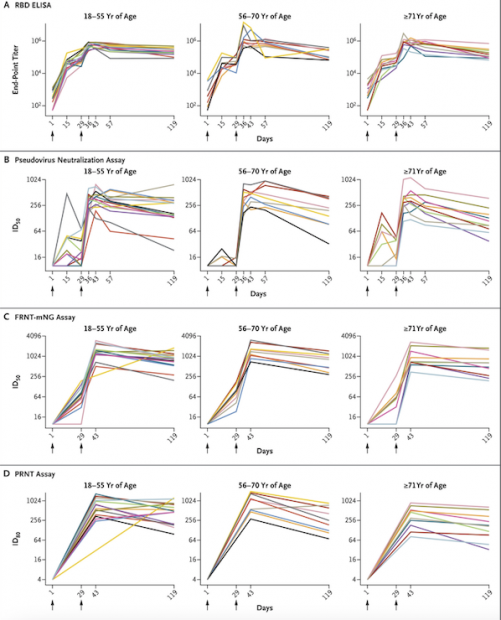阅读:0
听报道
今天,Moderna公司mRNA疫苗的研究人员们在新英格兰医学杂志( New England Journal of Medicine)上更新了对一、二期临床实验志愿者的跟踪数据,文章的链接如下(我在后面贴了英文版):
https://www.nejm.org/doi/full/10.1056/NEJMc2032195?query=RP
这项报道是在Phase 1疫苗注射57天后公布数据的基础上的再次跟踪测试,首次公布的数据曾显示,Moderna这款mRNA疫苗的初始抗体滴度达到了自然感染的4倍左右。而这一次发表的是在第一次注射后的119天(第二次注射后的90天)采集的34名健康成年受试对象的免疫数据,每两次的注射剂量各为100 μg,两剂之间相距28天,受试对象按年龄分成18-55岁、56-70岁和超过71岁三组来分析数据。这次跟踪实验的数据显示:
(1)尽管人类的免疫反应是随时间下降的,但是mRNA疫苗诱导的免疫反应不仅初始强度高于自然感染,在三个月的时间尺度上也是基本稳定的,没有出现断崖式下跌的趋势。
(2)中和抗体滴度基本上稳定并明显高于康复患者的水平的结果适用于各个年龄段。
以下是数据图:

这是一项非常鼓舞人心的实验结果,高初始抗体滴度和随时间稳定的免疫反应二者,使得这个疫苗提供保护作用的时间很可能不会少于一年,甚至超过一年,也就是说依靠疫苗达成群体免疫是完全可以做到的,不会出现后面一批人的疫苗还没来得及打、前面打过疫苗的人的免疫力已经消失了这种担忧。
Durability of Responses after SARS-CoV-2 mRNA-1273 Vaccination
TO THE EDITOR:
We recently reported the results of a phase 1 trial of a messenger RNA vaccine, mRNA-1273, to prevent infection with SARS-CoV-2; those interim results covered a period of 57 days after the first vaccination.1,2 Here, we describe immunogenicity data 119 days after the first vaccination (90 days after the second vaccination) in 34 healthy adult participants in the same trial who received two injections of vaccine at a dose of 100 μg. The injections were received 28 days apart. The recipients were stratified according to age (18 to 55 years, 56 to 70 years, or ≥71 years), and the assays used have been described previously.1,2
Figure 1. (同前)
Time Course of SARS-CoV-2 Antibody Binding and Neutralization Responses after mRNA-1273 Vaccination.
At the 100-μg dose, mRNA-1273 produced high levels of binding and neutralizing antibodies that declined slightly over time, as expected, but they remained elevated in all participants 3 months after the booster vaccination. Binding antibody responses to the spike receptor–binding domain were assessed by enzyme-linked immunosorbent assay. At the day 119 time point, the geometric mean titer (GMT) was 235,228 (95% confidence interval [CI], 177,236 to 312,195) in participants 18 to 55 years of age, 151,761 (95% CI, 88,571 to 260,033) in those 56 to 70 years of age, and 157,946 (95% CI, 94,345 to 264,420) in those 71 years of age or older (Figure 1).
Serum neutralizing antibodies continued to be detected in all the participants at day 119. On a pseudovirus neutralization assay, the 50% inhibitory dilution (ID50) GMT was 182 (95% CI, 112 to 296) in participants who were between the ages of 18 and 55 years, 167 (95% CI, 88 to 318) in those between the ages of 56 and 70 years, and 109 (95% CI, 68 to 175) in those 71 years of age or older. On the live-virus focus reduction neutralization test mNeonGreen assay, the ID50 GMT was 775 (95% CI, 560 to 1071), 685 (95% CI, 436 to 1077), and 552 (95% CI, 321 to 947) in the same three groups, respectively. On the live-virus plaque-reduction neutralization testing assay, the 80% inhibitory dilution GMT was similarly elevated at 430 (95% CI, 277 to 667), 269 (95% CI, 134 to 542), and 165 (95% CI, 82 to 332) in the same three groups, respectively (Figure 1).
At day 119, the binding and neutralizing GMTs exceeded the median GMTs in a panel of 41 controls who were convalescing from Covid-19, with a median of 34 days since diagnosis (range, 23 to 54).2 No serious adverse events were noted in the trial, no prespecified trial-halting rules were met, and no new adverse events that were considered by the investigators to be related to the vaccine occurred after day 57.
Although correlates of protection against SARS-CoV-2 infection in humans are not yet established, these results show that despite a slight expected decline in titers of binding and neutralizing antibodies, mRNA-1273 has the potential to provide durable humoral immunity. Natural infection produces variable antibody longevity3,4 and may induce robust memory B-cell responses despite low plasma neutralizing activity.4,5 Although the memory cellular response to mRNA-1273 is not yet defined, this vaccine elicited primary CD4 type 1 helper T responses 43 days after the first vaccination,2 and studies of vaccine-induced B cells are ongoing. Longitudinal vaccine responses are critically important, and a follow-up analysis to assess safety and immunogenicity in the participants for a period of 13 months is ongoing. Our findings provide support for the use of a 100-μg dose of mRNA-1273 in an ongoing phase 3 trial, which has recently shown a 94.5% efficacy rate in an interim analysis.
话题:
0
推荐
财新博客版权声明:财新博客所发布文章及图片之版权属博主本人及/或相关权利人所有,未经博主及/或相关权利人单独授权,任何网站、平面媒体不得予以转载。财新网对相关媒体的网站信息内容转载授权并不包括财新博客的文章及图片。博客文章均为作者个人观点,不代表财新网的立场和观点。



 京公网安备 11010502034662号
京公网安备 11010502034662号 